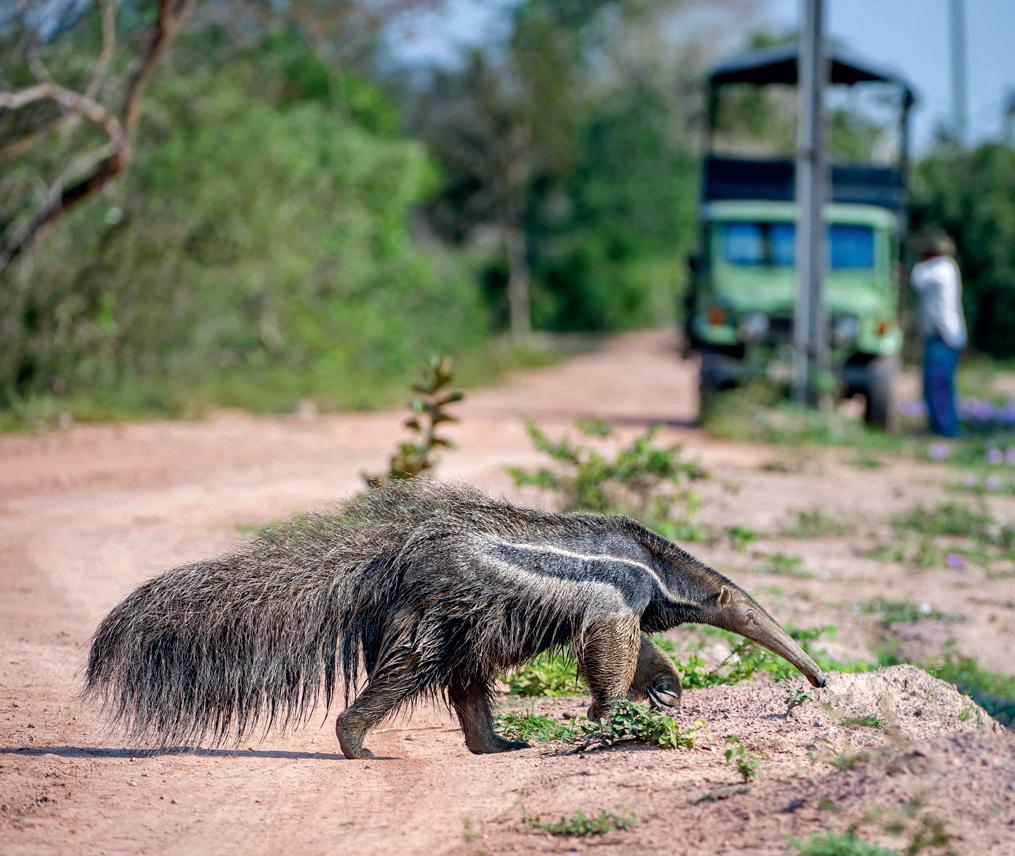
As the evening sky turns violet, the animals of the Pantanal gather near the water. Capybaras swim in tight formation, roseate spoonbills add smudges of pink to the riverbanks, the rumble of a jaguar pulsates from the forest.
This tropical wetland is the world's largest, stretching across Brazil, Paraguay and Bolivia, and hosts some of the greatest gatherings of animals anywhere. Now, scientists say the survival of the entire biome is at risk.
"The Pantanal is like Noah's ark. It is ... a place where those at risk of extinction can survive," said Pierre Girard, a professor at the Federal University of Mato Grosso. "That could be about to change. The Pantanal, as we know it, could soon cease to exist." The 17m hectare wild expanse harbours one of the world's most biologically rich environments, with at least 380 species of fish, 580 types of birds and 2,272 different plants. It is one of the main refuges for jaguars and houses a host of vulnerable and endangered species, including giant river otters, giant armadillos and hyacinth macaws.
But plans are under way to revive a project to turn the Paraguay River, one of the Pantanal's main arteries, into an industrial shipping route for crops such as soya beans and sugar.
Proponents say the waterway would reduce costs and time for exporting agricultural commodities but critics warn that its creation - which involves building new ports, possibly straightening bends and large-scale dredging - would cause irreversible damage to the wetland and wildlife.
"It seems a high price to pay: destroying the Pantanal, one of the world's unique systems, to reduce the price of grain," said Carolina Joana da Silva, a professor at Mato Grosso State University. "It is a war - a war which risks extinction." In a communal fishers' work shed in Cáceres, 64-year-old Elza Basto Pereira, the head of the community, said construction materials began arriving along the river six months ago.
Esta historia es de la edición August 16, 2024 de The Guardian Weekly.
Comience su prueba gratuita de Magzter GOLD de 7 días para acceder a miles de historias premium seleccionadas y a más de 9,000 revistas y periódicos.
Ya eres suscriptor ? Conectar
Esta historia es de la edición August 16, 2024 de The Guardian Weekly.
Comience su prueba gratuita de Magzter GOLD de 7 días para acceder a miles de historias premium seleccionadas y a más de 9,000 revistas y periódicos.
Ya eres suscriptor? Conectar

No 298 Bean, cabbage and coconut-milk soup
Deep, sweet heat. A soup that soothes and invigorates simultaneously.

Cottage cheese goes viral: in reluctant praise of a food trend
I was asked recently which food trends I think will take over in 2025.

I'm worried that my teenage son is in a toxic relationship
A year ago, our almost 18-year-old son began seeing a girl, who is a year older than him and is his first \"real\" girlfriend.

BOOKS OF THE MONTH
A roundup of the best recent science fiction, fantasy and horror

Dying words
The Nobel prize winner explores the moment of death and beyond in a probing tale of a fisher living in near solitude

Origin story
We homo sapiens evolved and succeeded when other hominins didn't-but now our expansionist drive is threatening the planet

Glad rags to riches
Sarcastic, self-aware and surprisingly sad, the first volume of Cher's extraordinary memoir mixes hard times with the high life

Sail of the century
Anenigmatic nautical radio bulletin first broadcast 100 years ago, the Shipping Forecast has beguiled and inspired poets, pop stars and listeners worldwide

How does it feel?
A Complete Unknown retells Bob Dylan's explosive rise, but it als resonates with today's toxic fame and politics. The creative team expl their process-and wha the singer made of it all
Jane Austen's enduring legacy lies in her relevance as a foil for modern mores
For some, it will be enough merely to re-read Persuasion, and thence to cry yet again at Captain Wentworth's declaration of utmost love for Anne Elliot.